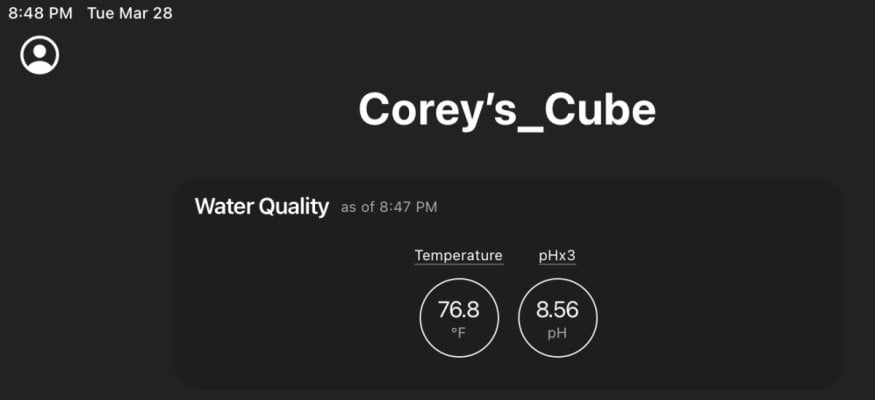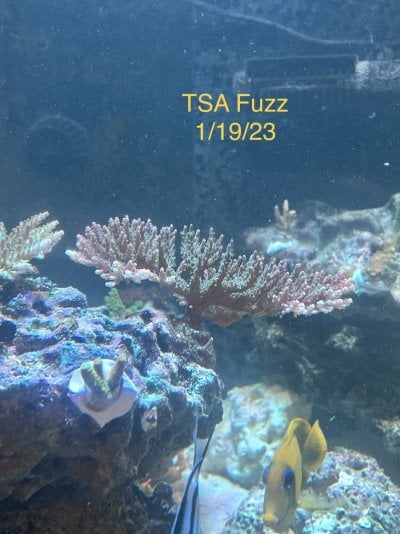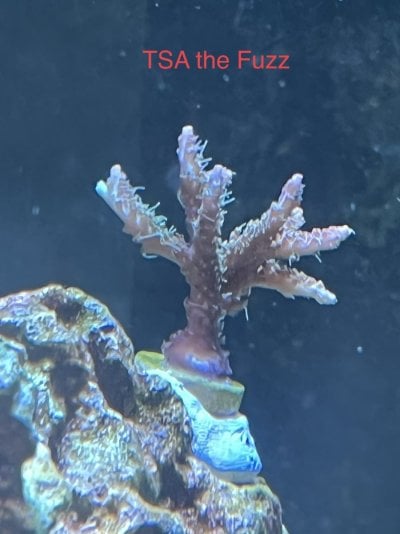Without dosing my pH is highest when my lights go off and lowest when they come on. Alk is going to swing the opposite of pH. I started dosing 2 part during the night only, this leveled pH very well, but it is going to increase my Alk swing. So I asked Randy in the Chemistry forum which was better, and he said there was convincing evidence either way. I did some more reading on this, and also have been thinking back on my own experience.
When I started more than 20 years ago, everyone chased pH. The only thing I added was kalkwasser (manually mixed and poured every day), and even Acropora grew well even under PC compacts and little flow. Kalkwasser has the drawback that even if you add 100% of your evaporation, you won't keep up with Calcium/Alkalinity in even a modestly successful tank. I did try a calcium reactor a few times, but decided against it. It is set-and-forget if everything goes well, but it is a lot more work than kalkwasser when something goes wrong. Corals didn't look nearly as good either. So I went back to kalkwasser and started adding 2 part, and both tested better and my corals looked better than anything else I've tried. But eliminating kalkwasser altogether saved a lot of my time, even though corals didn't do as well. Moving to an automatic doser saved even more time, but then I had no way to affect pH in the short term, and everyone at that point was saying not to chase pH. Replacing the doser with an Apex and DOS, I can now add 2 part at whatever time I want, so I have the option to chase pH again. I can even buy a Trident and dose to keep Alk perfectly stable and not worry about pH, and that seems like what the owners of the best Acropora tanks are doing. But meanwhile, my own tank seems to look better now that I leveled my pH even though my Alk is swinging more.
So I wanted to ask the Acropora community - do you primarily track and adjust pH or Alk? Have you changed? Which works better for you?
When I started more than 20 years ago, everyone chased pH. The only thing I added was kalkwasser (manually mixed and poured every day), and even Acropora grew well even under PC compacts and little flow. Kalkwasser has the drawback that even if you add 100% of your evaporation, you won't keep up with Calcium/Alkalinity in even a modestly successful tank. I did try a calcium reactor a few times, but decided against it. It is set-and-forget if everything goes well, but it is a lot more work than kalkwasser when something goes wrong. Corals didn't look nearly as good either. So I went back to kalkwasser and started adding 2 part, and both tested better and my corals looked better than anything else I've tried. But eliminating kalkwasser altogether saved a lot of my time, even though corals didn't do as well. Moving to an automatic doser saved even more time, but then I had no way to affect pH in the short term, and everyone at that point was saying not to chase pH. Replacing the doser with an Apex and DOS, I can now add 2 part at whatever time I want, so I have the option to chase pH again. I can even buy a Trident and dose to keep Alk perfectly stable and not worry about pH, and that seems like what the owners of the best Acropora tanks are doing. But meanwhile, my own tank seems to look better now that I leveled my pH even though my Alk is swinging more.
So I wanted to ask the Acropora community - do you primarily track and adjust pH or Alk? Have you changed? Which works better for you?





















